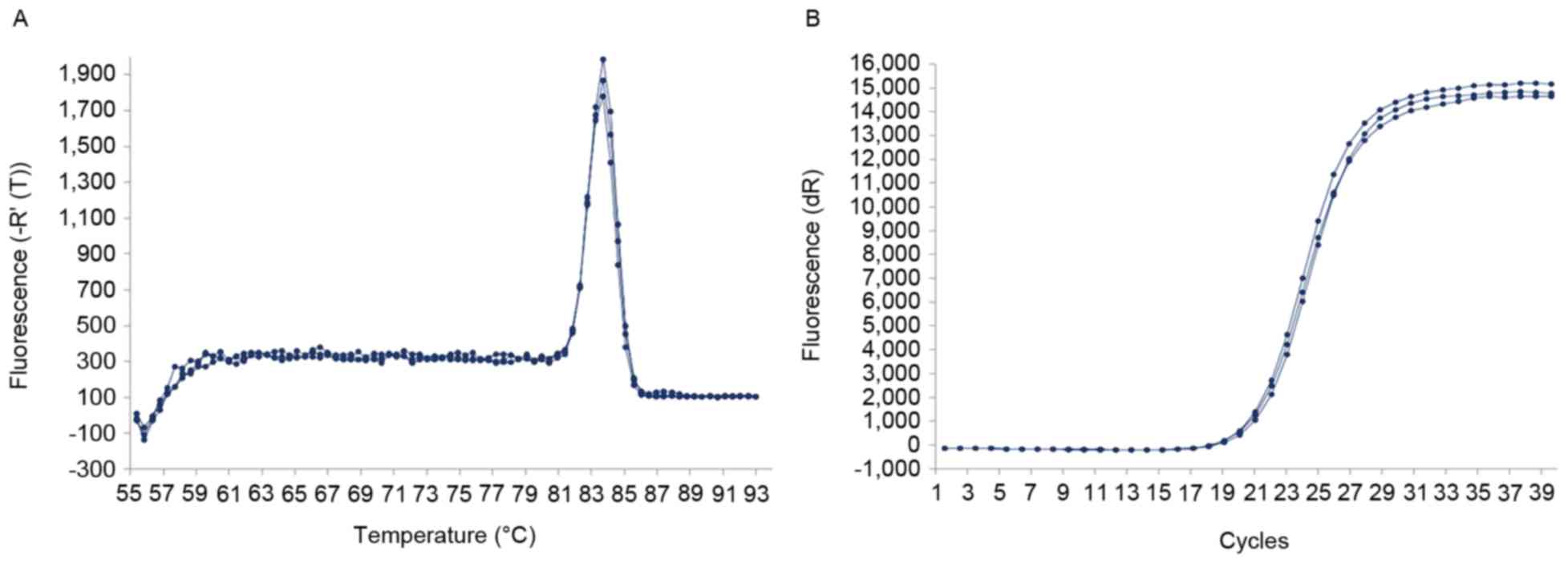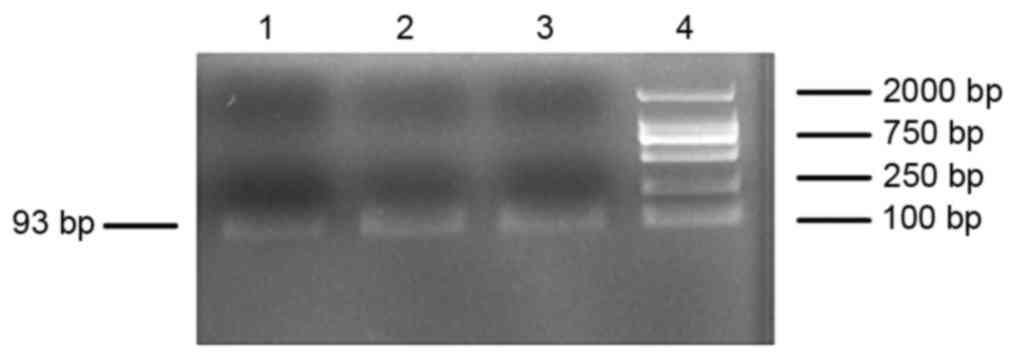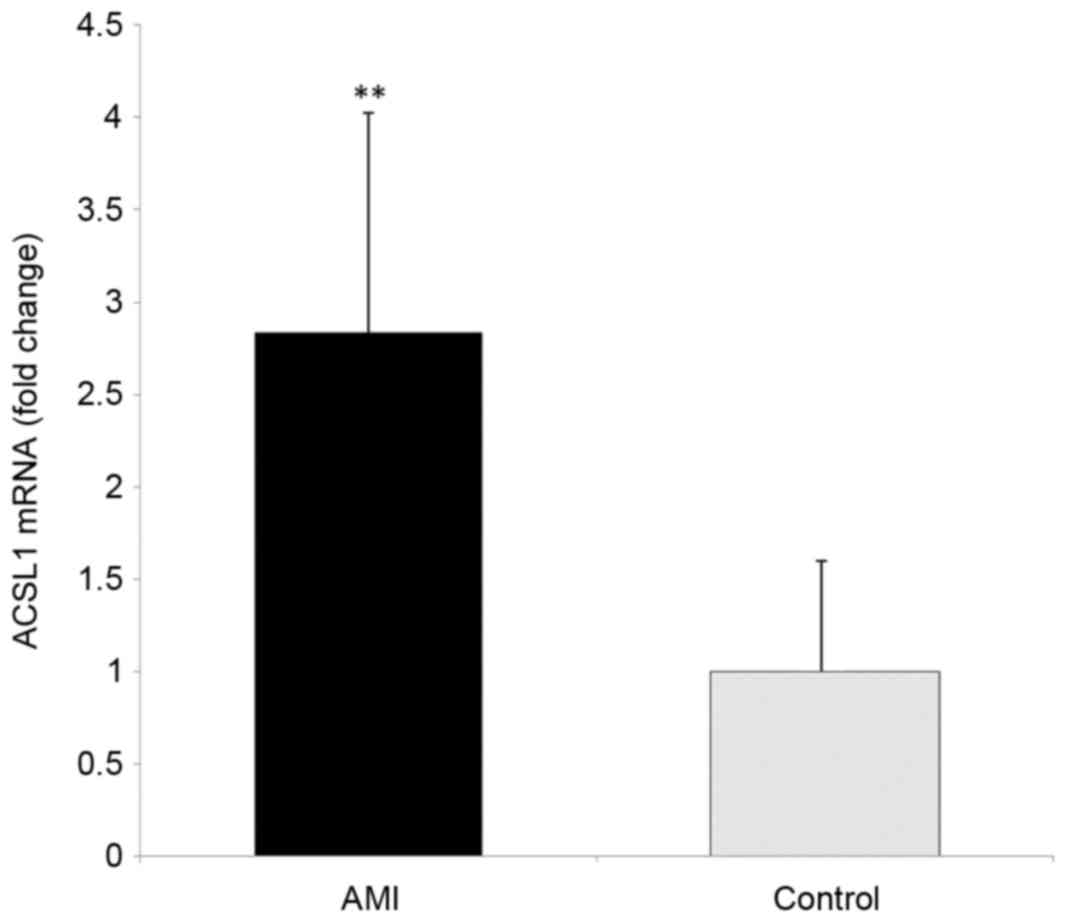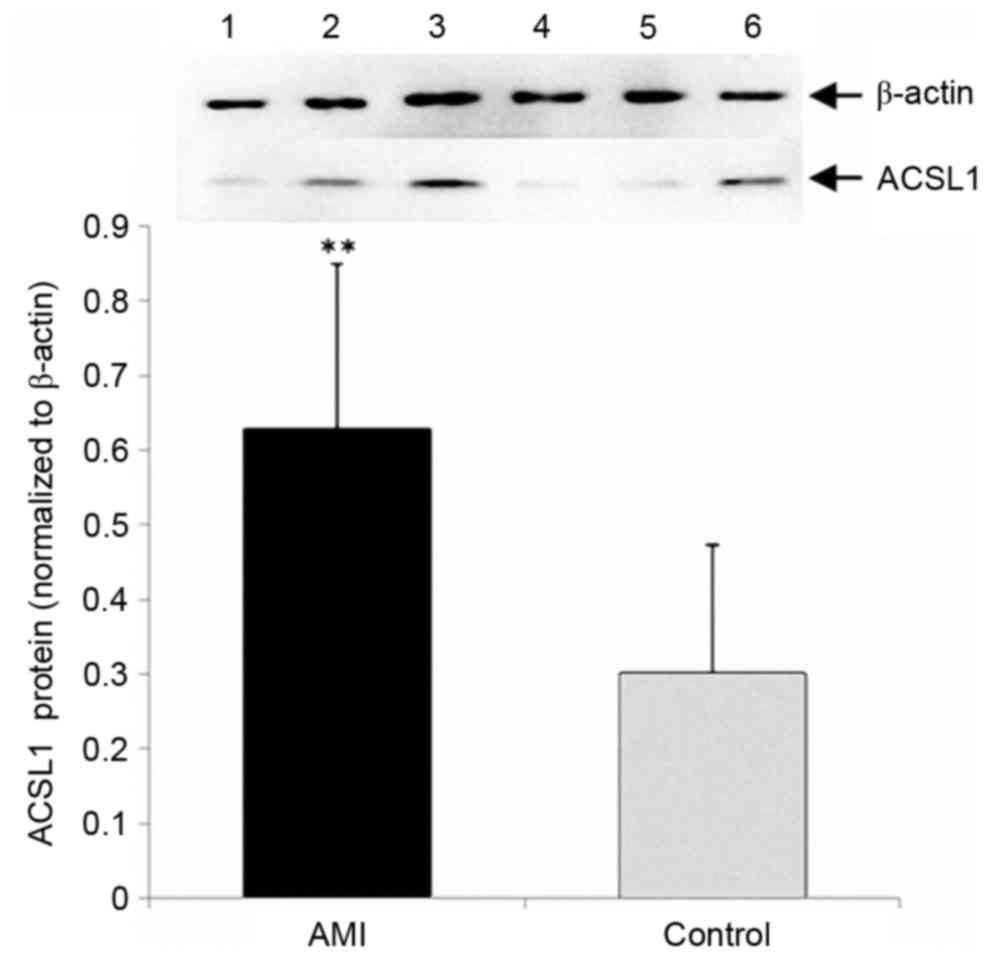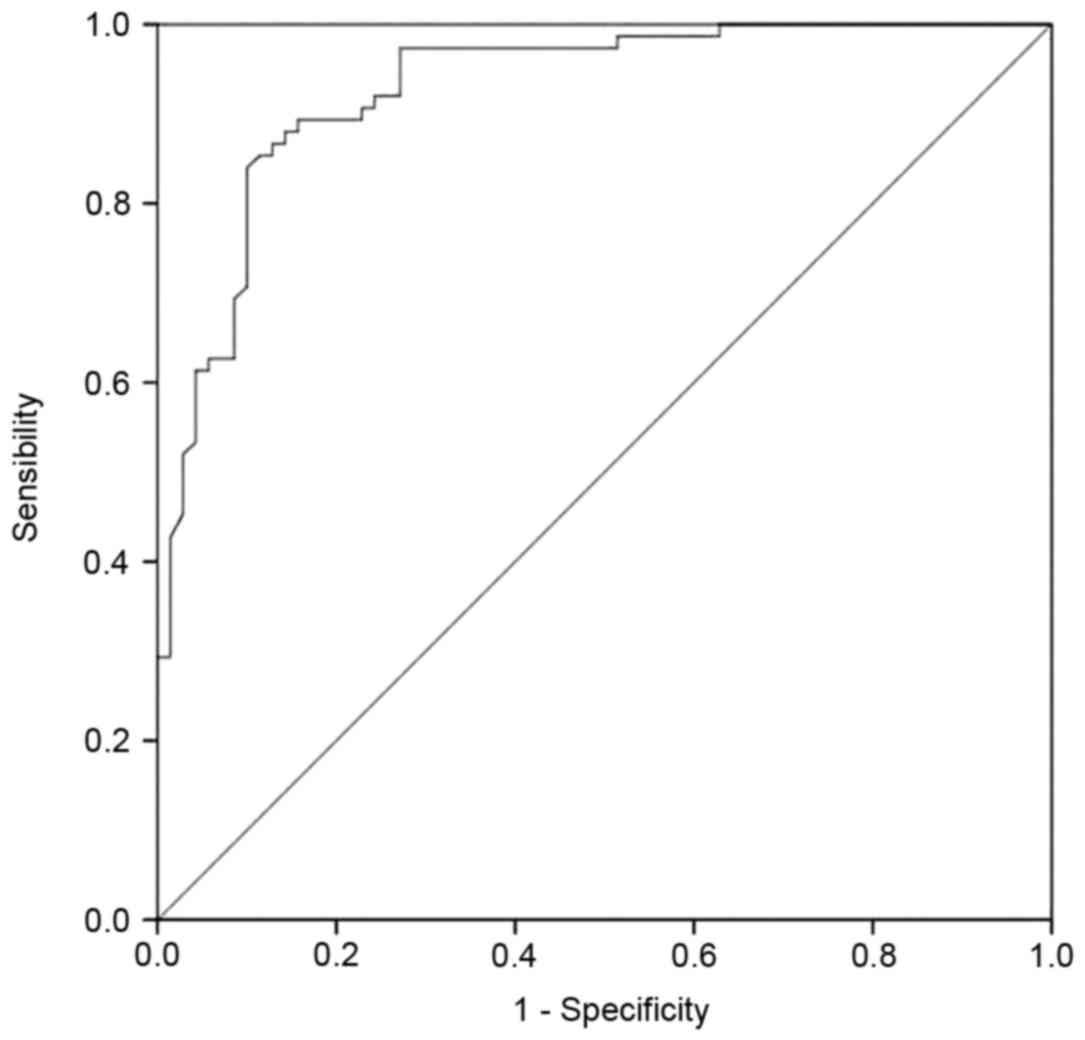|
1
|
Lopez AD and Mathers CD: Measuring the
global burden of disease and epidemiological transitions:
2002–2030. Ann Trop Med Parasitol. 100:481–499. 2006. View Article : Google Scholar : PubMed/NCBI
|
|
2
|
Moran AE, Forouzanfar MH, Roth GA, Mensah
GA, Ezzati M, Flaxman A, Murray CJ and Naghavi M: The global burden
of ischemic heart disease in 1990 and 2010: The global burden of
disease 2010 study. Circulation. 129:1493–1501. 2014. View Article : Google Scholar : PubMed/NCBI
|
|
3
|
Moreira DM, da Silva RL, Vieira JL, Fattah
T, Lueneberg ME and Gottschall CA: Role of vascular inflammation in
coronary artery disease: Potential of anti-inflammatory drugs in
the prevention of atherothrombosis. Inflammation and
anti-inflammatory drugs in coronary artery disease. Am J Cardiovasc
Drugs. 15:1–111. 2015. View Article : Google Scholar : PubMed/NCBI
|
|
4
|
White HD and Chew DP: Acute myocardial
infarction. Lancet. 372:570–584. 2008. View Article : Google Scholar : PubMed/NCBI
|
|
5
|
Zdravkovic S, Wienke A, Pedersen NL and de
Faire U: Genetic susceptibility of myocardial infarction. Twin Res
Hum Genet. 10:848–852. 2007. View Article : Google Scholar : PubMed/NCBI
|
|
6
|
Zhang Y, Lin P, Jiang H, Xu J, Luo S, Mo
J, Li Y and Chen X: Extensive serum biomarker analysis in patients
with ST segment elevation myocardial infarction (STEMI). Cytokine.
76:356–362. 2015. View Article : Google Scholar : PubMed/NCBI
|
|
7
|
Yan S, Yang XF, Liu HL, Fu N, Ouyang Y and
Qing K: Long-chain acyl-CoA synthetase in fatty acid metabolism
involved in liver and other diseases: An update. World J
Gastroenterol. 21:3492–3498. 2015. View Article : Google Scholar : PubMed/NCBI
|
|
8
|
Coleman RA, Lewin TM and Muoio DM:
Physiological and nutritional regulation of enzymes of
triacylglycerol synthesis. Annu Rev Nutr. 20:77–103. 2000.
View Article : Google Scholar : PubMed/NCBI
|
|
9
|
Soupene E and Kuypers FA: Mammalian
long-chain acyl-CoA synthetases. Exp Biol Med (Maywood).
233:507–521. 2008. View Article : Google Scholar : PubMed/NCBI
|
|
10
|
Li LO, Mashek DG, An J, Doughman SD,
Newgard CB and Coleman RA: Overexpression of rat long chain
acyl-coa synthetase 1 alters fatty acid metabolism in rat primary
hepatocytes. J Biol Chem. 281:37246–37255. 2006. View Article : Google Scholar : PubMed/NCBI
|
|
11
|
Xudong Guo, Lin Fan, Xiangdong Li and
Fanbo Meng: Microarray analysis of differential gene expression
profile in the peripheral blood cells of the patients with
myocardial infarction. ResearchGate. DOI:
10.1016/j.jacc.2015.06.596.
|
|
12
|
Thygesen K, Alpert JS, Jaffe AS, Simoons
ML, Chaitman BR and White HD: Writing Group on the Joint
ESC/ACCF/AHA/WHF Task Force for the Universal Definition of
Myocardial Infarction. Thygesen K, Alpert JS, White HD, et al:
Third universal definition of myocardial infarction. Eur Heart J.
33:2551–2567. 2012.
|
|
13
|
Livak KJ and Schmittgen TD: Analysis of
relative gene expression data using real-time quantitative PCR and
the 2(-Delta Delta C(T)) method. Methods. 25:402–408. 2001.
View Article : Google Scholar : PubMed/NCBI
|
|
14
|
Hughes G: Youden's index and the weight of
evidence. Methods Inf Med. 54:198–199. 2015. View Article : Google Scholar : PubMed/NCBI
|
|
15
|
Zeller T, Blankenberg S and Diemert P:
Genomewide association studies in cardiovascular disease-an update
2011. Clin Chem. 58:92–103. 2012. View Article : Google Scholar : PubMed/NCBI
|
|
16
|
Kullo IJ and Ding K: Mechanisms of
disease: The genetic basis of coronary heart disease. Nat Clin
Pract Cardiovasc Med. 4:558–569. 2007. View Article : Google Scholar : PubMed/NCBI
|
|
17
|
Joehanes R, Ying S, Huan T, Johnson AD,
Raghavachari N, Wang R, Liu P, Woodhouse KA, Sen SK, Tanriverdi K,
et al et al: Gene expression signatures of coronary heart disease.
Arterioscler Thromb Vasc Biol. 33:1418–1426. 2013. View Article : Google Scholar : PubMed/NCBI
|
|
18
|
Friede KA, Ginsburg GS and Voora D: Gene
expression signatures and the spectrum of coronary artery disease.
J Cardiovasc Transl Res. 8:339–352. 2015. View Article : Google Scholar : PubMed/NCBI
|
|
19
|
Ogawa N, Imai Y, Morita H and Nagai R:
Genome-wide association study of coronary artery disease. Int J
Hypertens. 21:7905392010.
|
|
20
|
Wang YL, Guo W, Zang Y, Yaney GC, Vallega
G, Getty-Kaushik L, Pilch P, Kandror K and Corkey BE: Acyl coenzyme
a synthetase regulation: Putative role in long-chain acyl coenzyme
a partitioning. Obes Res. 12:1781–1788. 2004. View Article : Google Scholar : PubMed/NCBI
|
|
21
|
Parkes HA, Preston E, Wilks D, Ballesteros
M, Carpenter L, Wood L, Kraegen EW, Furler SM and Cooney GJ:
Overexpression of acyl-CoA synthetase-1 increases lipid deposition
in hepatic (HepG2) cells and rodent liver in vivo. Am J Physiol
Endocrinol Metab. 291:E737–E744. 2006. View Article : Google Scholar : PubMed/NCBI
|
|
22
|
Li LO, Klett EL and Coleman RA: Acyl-CoA
synthesis, lipid metabolism and lipotoxicity. Biochim Biophys Acta.
1801:246–251. 2010. View Article : Google Scholar : PubMed/NCBI
|
|
23
|
Kanter JE, Tang C, Oram JF and Bornfeldt
KE: Acyl-CoA synthetase 1 is required for oleate and linoleate
mediated inhibition of cholesterol efflux through ATP-binding
cassette transporter A1 in macrophages. Biochim Biophys Acta.
1821:358–364. 2012. View Article : Google Scholar : PubMed/NCBI
|
|
24
|
Ellis JM, Li LO, Wu PC, Koves TR, Ilkayeva
O, Stevens RD, Watkins SM, Muoio DM and Coleman RA: Adipose
acyl-CoA synthetase-1 directs fatty acids toward beta-oxidation and
is required for cold thermogenesis. Cell Metab. 12:53–64. 2010.
View Article : Google Scholar : PubMed/NCBI
|
|
25
|
Joseph R, Poschmann J, Sukarieh R, Too PG,
Julien SG, Xu F, Teh AL, Holbrook JD, Ng KL, Chong YS, et al: ACSL1
is associated with fetal programming of insulin sensitivity and
cellular lipid content. Mol Endocrinol. 29:909–920. 2015.
View Article : Google Scholar : PubMed/NCBI
|
|
26
|
Zhan T, Poppelreuther M, Ehehalt R and
Füllekrug J: Overexpressed FATP1, ACSVL4/FATP4 and ACSL1 increase
the cellular fatty acid uptake of 3T3-L1 adipocytes but are
localized on intracellular membranes. PLoS One. 7:e450872012.
View Article : Google Scholar : PubMed/NCBI
|
|
27
|
Zimmerman J, Fromm R, Meyer D, Boudreaux
A, Wun CC, Smalling R, Davis B, Habib G and Roberts R: Diagnostic
marker cooperative study for the diagnosis of myocardial
infarction. Circulation. 99:1671–1677. 1999. View Article : Google Scholar : PubMed/NCBI
|
|
28
|
Boden H, Ahmed TA, Velders MA, van der
Hoeven BL, Hoogslag GE, Bootsma M, le Cessie S, Cobbaert CM,
Delgado V, van der Laarse A and Schalij MJ: Peak and fixed-time
high-sensitive troponin for prediction of infarct size, impaired
left ventricular function and adverse outcomes in patients with
first ST-segment elevation myocardial infarction receiving
percutaneous coronary intervention. Am J Cardiol. 111:1387–1393.
2013. View Article : Google Scholar : PubMed/NCBI
|
|
29
|
Kanter JE, Kramer F, Barnhart S, Averill
MM, Vivekanandan-Giri A, Vickery T, Li LO, Becker L, Yuan W, Chait
A, et al et al: Diabetes promotes an inflammatory macrophage
phenotype and atherosclerosis through acyl-CoA synthetase 1. Proc
Natl Acad Sci USA. 109:E715–E724. 2012. View Article : Google Scholar : PubMed/NCBI
|
|
30
|
Renard CB, Kramer F, Johansson F, Lamharzi
N, Tannock LR, von Herrath MG, Chait A and Bornfeldt KE: Diabetes
and diabetes-associated lipid abnormalities have distinct effects
on initiation and progression of atherosclerotic lesions. J Clin
Invest. 114:659–668. 2004. View Article : Google Scholar : PubMed/NCBI
|
|
31
|
Ricciotti E and FitzGerald GA:
Prostaglandins and inflammation. Arterioscler Thromb Vasc Biol.
31:986–1000E7. 2011. View Article : Google Scholar : PubMed/NCBI
|
|
32
|
Kanter JE and Bornfeldt KE: Inflammation
and diabetes-accelerated atherosclerosis: Myeloid cell mediators.
Trends Endocrinol Metab. 24:137–144. 2013. View Article : Google Scholar : PubMed/NCBI
|















